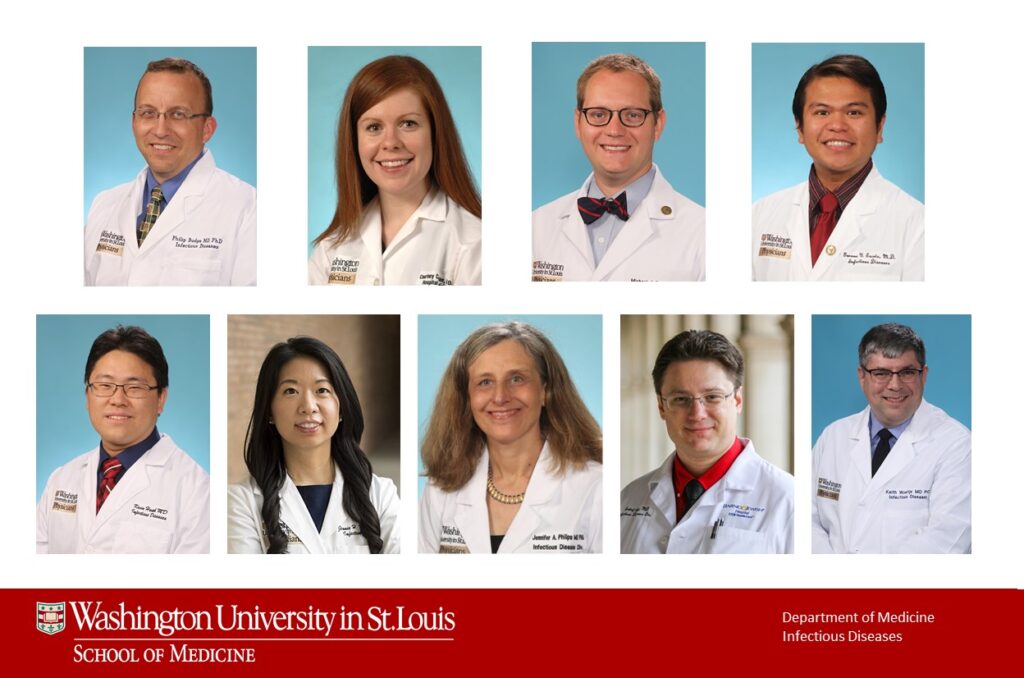We are proud to announce the following faculty, each who have been named a Fellow by the Infectious Diseases Society of America, the nation’s leading infectious diseases professional society. Fellowship in IDSA is one of the highest honors in the field of infectious diseases. It recognizes distinguished clinicians and scientists from the United States and around the world who have achieved professional excellence and provided significant service to the profession.
Philip J. Budge, MD, PhD, Associate Professor of Medicine, specializes in translational, public health-related research, with a special focus on filarial infections—insect-borne threadlike parasitic worms that cause lymphatic filariasis (elephantiasis), onchocerciasis (river blindness), and loiasis (African eye worm). Basic science work in the Budge lab aims to improve diagnostic tools for filarial infections through the identification of novel biomarkers.
Courtney Chrisler, MD, Assistant Professor of Medicine, alumna 2011 , specializes in general infectious diseases with a focus on management of acutely hospitalized patients, clinical education, and patient safety and quality improvement.
Michael Durkin, MD, MPH, Assistant Professor of Medicine, is the co-director of animicrobial stewardship and an associate hospital epidemiologist at Barnes-Jewish Hospital. He is also the medical director of infection prevention and antibiotic stewardship at Barnes Jewish St. Peters and Progress West Hospitals. He uses administrative data to identify opportunities to improve antibiotic prescribing in outpatient settings. He disseminates antibiotic stewardship interventions using dissemination & implementation science and informatics technology
Gerome Escota, MD, Associate Professor of Medicine, alumnus 2011, specializes in clinical infectious disease, with a special focus on medical education, health disparities, HIV, and sexually transmitted infections (STI). Dr. Escota is the co-director of the Infectious Disease Fellowship Program and the Director of the Internal Medicine Clerkship. He also serves as Chair of the Teaching and Learning Resources Workgroup of the Infectious Disease Society of America Medical Education Community of Practice (IDSA MedEdCOP).
Kevin Hsueh, MD, Assistant Professor Medicine, is the Medical Director of the Barnes-Jewish Hospital (BJH) Antimicrobial Stewardship Program and Chair of the BJH and BJC HealthCare (BJC) Antimicrobial Pharmacy and Therapeutics Subcommittees. Dr. Hsueh specializes in Antimicrobial Stewardship and Infection Prevention, with special focus on practical design and implementation of healthcare quality and safety improvement interventions.
Jennifer H. Kwon, DO, MSCI, Assistant Professor of Medicine, alumna 2013, specializes in clinical and translational research with a focus on antimicrobial resistance and infection prevention.
Jennifer A. Philips, MD, PhD, Associate Professor of Medicine and Molecular Microbiology & Co-director, Infectious Diseases Division is the principal investigator of an NIH-funded lab that studies how Mycobacterium tuberculosis evades the host immune response.
Andrej Spec, MD, MSCI, Assistant Professor of Medicine, alumnus 2013, focuses his research on fungal infections, particularly in immunocompromised patients, including those with transplants. infections. His research involves Cryptococcus, Histoplasma, Candida, Aspergillus and other invasive molds.
Keith F. Woeltje, MD, PhD, Professor of Medicine, alumnus 1997, serves as co-lead, Biomedical Informatics in the Institute of Clinical and Translational Science, and serves as Medical Director of Advanced Analytics and Clinical Decision Support for BJC HealthCare.
“The 199 individuals chosen to receive the FIDSA designation this year are committed to blazing trails in the field of infectious diseases, and IDSA is proud to honor them,” said Dan McQuillen, MD, FIDSA, president of IDSA. “There has never been a more critical or more exciting time for the field of infectious diseases. These ID physicians and scientists are on the front lines of research and clinical care and represent the passion and commitment to educate and protect us from dangerous illness. We all benefit as a result of their vital contributions to local communities and expertise within the field of medicine. I am proud to call them my colleagues.”
Applicants for IDSA Fellowship must be nominated by their peers and meet specified criteria that include continuing identification with the field of infectious diseases, national or regional recognition and publication of their scholarly work. Nominees are reviewed and elected by the IDSA Board of Directors. Fellows of IDSA work in many different settings, including clinical practice, teaching, research, public health and health care administration.
